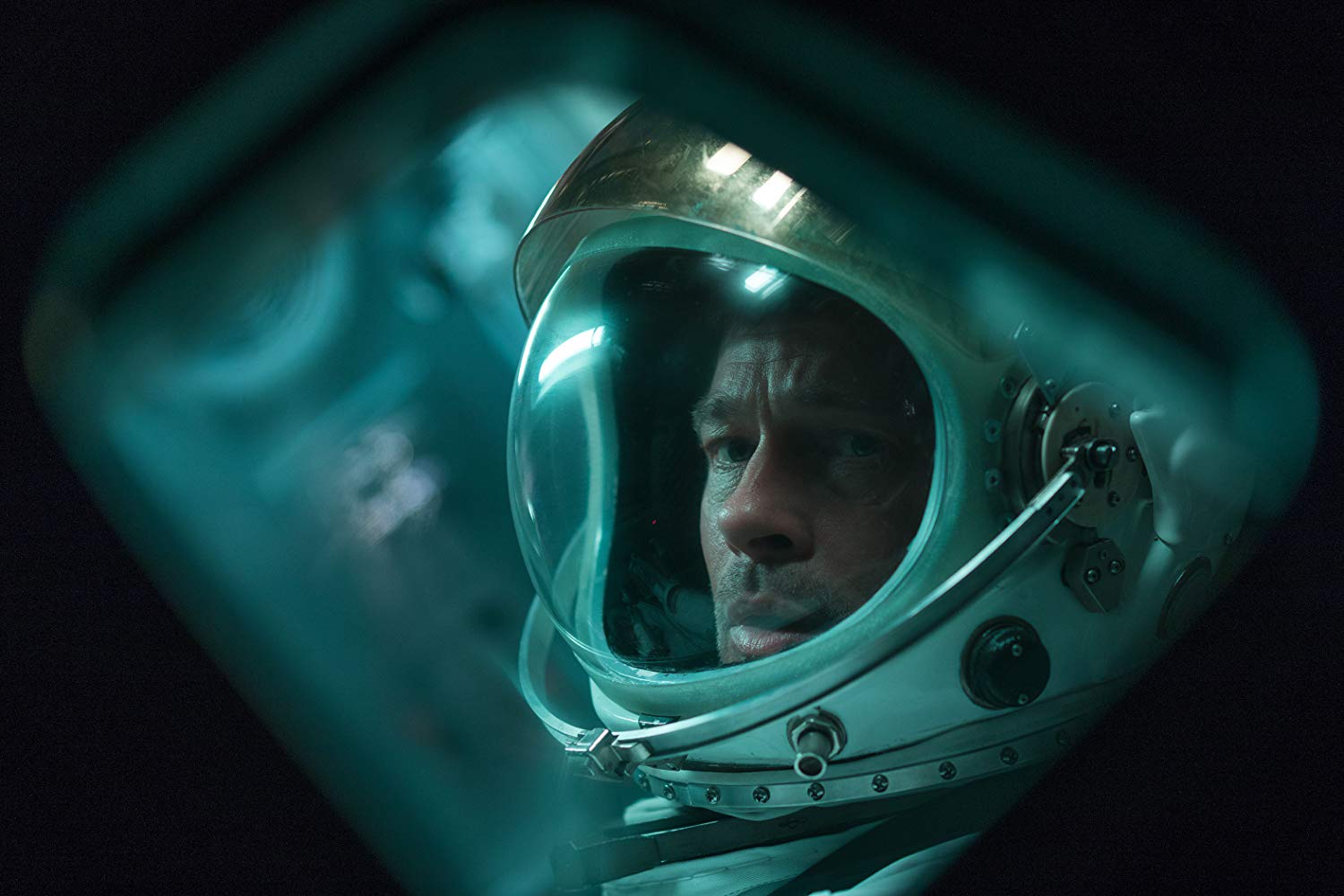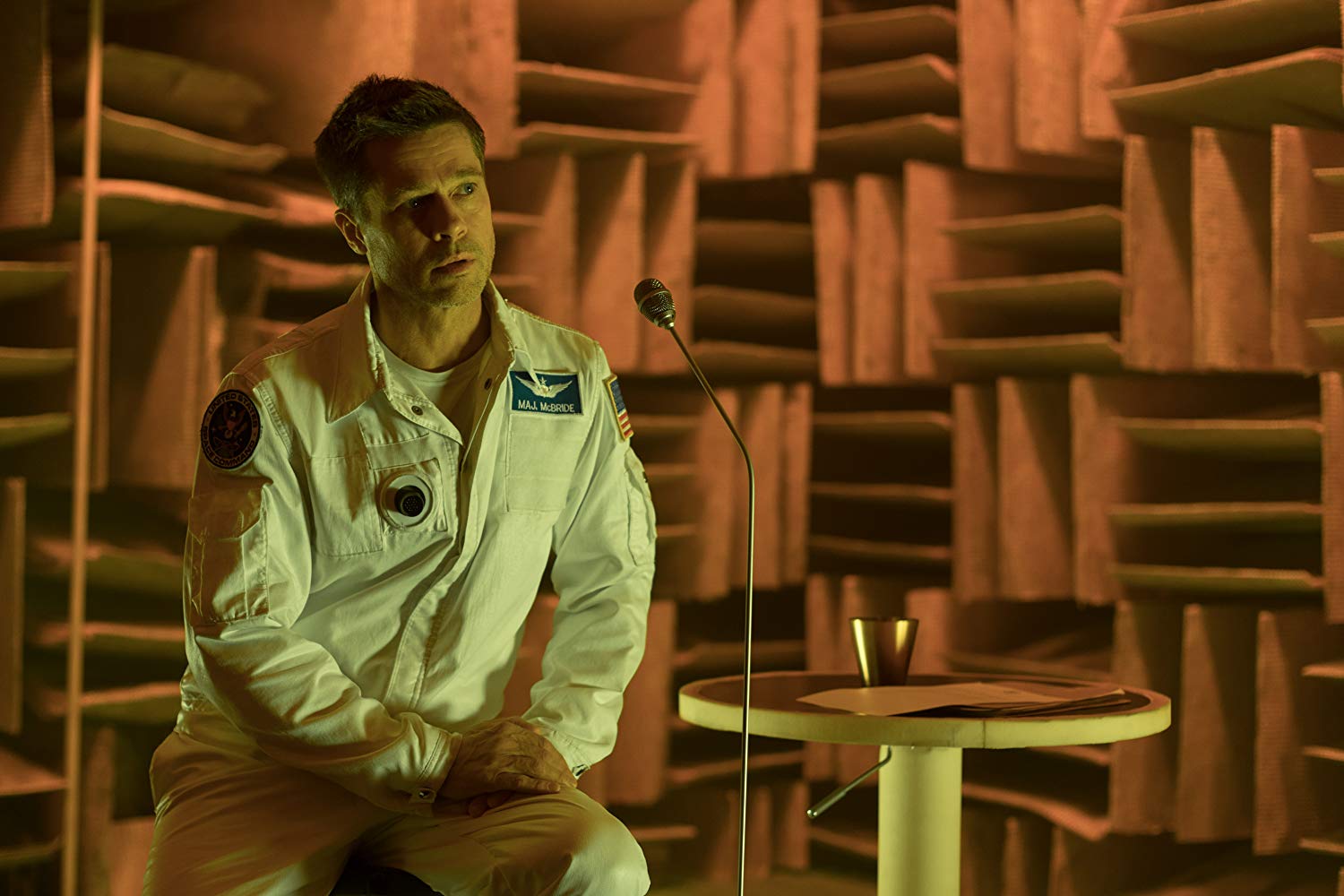Ad Astra DVD Review

Writer and director James Gray has stated that he wanted to create a film that most accurately depicted space travel – in all its vast, slow bleakness. Most of that is certainly reflected in Ad Astra, but there’s a question of whether that actually makes it a good film.
Our story begins in the near future, wherein during a time a “hope and conflict”, effort has been made to turn to space for intelligent life and subsequent guidance for progress. Involved in such a mission is Major Roy McBride (Brad Pitt). Roy is a legacy astronaut and his name precedes him – his father, H. Clifford McBride, was the leader of a mission (the Lima Project) from 29 years ago, but has not been heard of for the last 16, ever since they reached Neptune. Roy is working on a space station when powerful surges begin occurring, nearly wiping out the station entirely. The surges are traced to the Lima Project. It’s at this point that Roy is informed by his military superiors that his family is suspected to still be alive. Covertly, Roy is sent on a mission to establish contact alongside other astronauts heading for the Mars base, upon which things begin to go wrong.
Though it boasts a famed supporting cast (Donald Sutherland arguably chief among them), the lone star of Ad Astra is, essentially, Brad Pitt, and despite being one of the most well-known beings on the planet for most of his career, his casting – surprisingly – isn’t distracting. His performance distances the audience from Brad Pitt, tabloid mainstay and famous actor. He carries the film easily and mostly on his own, proving his lasting leading man power (though, as of late he’s receiving most of his praise because of his ability to support Leonardo DiCaprio in Once Upon a Time… In Hollywood).
Ad Astra asks many questions. About space, our place in it as humans, what it means to be human, how our genetics and parents influence who we are. Unfortunately, it asks many of them quite literally, because of Roy’s near-constant and redundant voice-over narration. For all the attention-to-detail Gray paid to the space travel, it seems there was concern the audience wouldn’t be able to follow the emotional journey of the character, despite casting one of the most famously magnetic men on the planet as his lead. While the scenario isn’t relatable in the classic sense (how many of us have estranged parents trying to find intelligent life in space, stranded on Neptune?), it’s a human enough story that we don’t need the internal monologues to understand the emotions behind it, particularly as mission logs are already employed in the story for any information that isn’t on screen. Tension is played with stunning accuracy, particularly in how Pitt is able to play a steady presence in the face of it. He could even do a lot more, in his placidity, if the voiceover allowed him to. Instead, all nuance is smoothed out. In fact, given his established repression in light of his trauma, it’s a level of profound self-awareness and introspection that feels jarring to such a character. Nevertheless, we do get enough moments of quiet to really appreciate the work of Max Richter’s score, which makes the entire difference; even the Academy agrees, choosing to recognise the Sound Mixing by Gary Rydstrom, Tom Johnson and Mark Ulano. All of this together creates a meditative, pensive atmosphere, which is perfect for the tone Gray clearly wanted.
Tension is played with stunning accuracy, particularly in how Pitt is able to play a steady presence in the face of it. He could even do a lot more, in his placidity, if the voiceover allowed him to. Instead, all nuance is smoothed out. In fact, given his established repression in light of his trauma, it’s a level of profound self-awareness and introspection that feels jarring to such a character. Nevertheless, we do get enough moments of quiet to really appreciate the work of Max Richter’s score, which makes the entire difference; even the Academy agrees, choosing to recognise the Sound Mixing by Gary Rydstrom, Tom Johnson and Mark Ulano. All of this together creates a meditative, pensive atmosphere, which is perfect for the tone Gray clearly wanted.
The production design too is noticeably striking, capably doing most of the world-building for us, especially when we go to the Mars space station. It’s almost a shame – no spoilers – we don’t spend more time exploring that environment.
Similarly, on Mars is where we meet Ruth Negga, who is also criminally under-utilised, as she’s just as engaging on screen as Pitt. In general, there’s a total dearth of female characters at all. Liv Tyler is wasted on the cookie-cutter ex-wife role, one of whose only lines, ironically, is, “I am my own person,” – she doesn’t speak again, so we’ll have to take the script’s word for it. In terms of human relationships, this is primarily a father-son movie. So plainly, it is posed, “In the end, the son suffers the sin of the father.”
There might be some commentary on humanity at large in this sentiment – that we are destined to either follow in the mistakes of our predecessors or parents, or forever be trying to escape their failures, so much that we turned to space for a new path. Ad Astra doesn’t really believe in such notions, so the hopeful tone of the ending is a little startling, but definitely bold for a science-fiction narrative and a new, unifying statement. That we should look to ourselves, rather than the stars, for where to go next. More than that, it seems to have faith in humanity’s aptitude for adapting to new circumstances, especially if we hold on to the right people.
★★★
Ad Astra is out on Blu-ray and DVD now.


